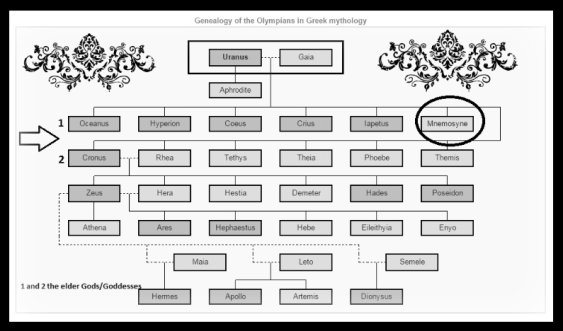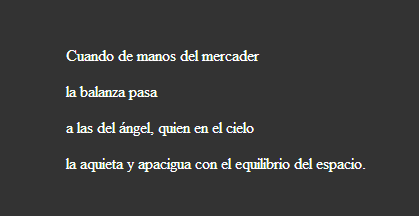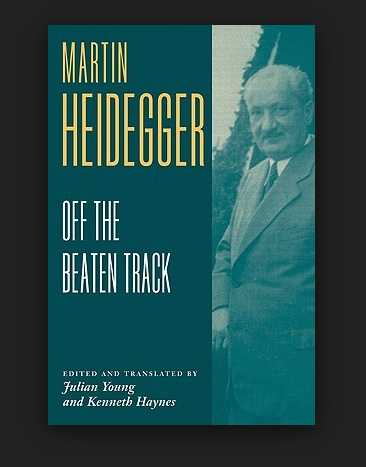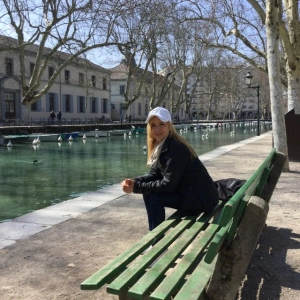
![]()

“Mnemosyne” by Dante Gabriel Rossetti (1881) .-
![]()
____________________________________________________________________________________________________________
Mnemosyne/ Μνημοσύνη (Roman equivalent: Moneta(0)) was a Titaness, goddess of Memory (1) and the inventor of Words (2).
Mnemosyne was also a goddess of time. She represented the rote memorisation required, before the introduction of writing, to preserve the stories of history and sagas of myth. She was the daughter of Uranus (Heaven) and Gaia (Earth). Uranus and Gaia were the parents of the first generation of Titans, consisting of twelve elder gods/goddesses, being Mnemosyne included among them.
____________________________________________________________________________________________________________

Genealogy of the Olympians in Greek mythology, Mnemosyne among them.-
Longing for a way to preserve the memory of his many great feats, he dressed as a shepherd and went to find Mnemosyne.
The account tells that Zeus and Mnemosyne slept together for nine consecutive nights, thus birthing the nine Muses (3).


“Apollo and the Muses” by Simon Vouet. 1640.
 ____________________________________________________________________________________________________________
____________________________________________________________________________________________________________ Mnemosyne’s name derives from Mene, Moon, and mosune, ‘wooden house’ or ‘tower’, so literally means ‘the House of the Moon’.
Mnemosyne’s name derives from Mene, Moon, and mosune, ‘wooden house’ or ‘tower’, so literally means ‘the House of the Moon’.
“Mnemosyne, The Mother of the Muses” by Frederic Leighton. (19th century).
Aletheia (ἀλήθεια) is a Greek word variously translated as “unclosedness”, “unconcealedness”, “disclosure” or “truth”. Contained within the etymology of the word Aletheia is “lethe” meaning “forgetfulness”, “oblivion” and also applicable to one of the five rivers of the Underworld in Hades, as it was previously said.
The german philosopher, Martin Heidegger in his book “Time and Being” drew out an understanding of the term as ‘unconcealedness’. According to him, aletheia is distinct from conceptions of truth understood as statements which accurately describe a state of affairs (correspondence), or statements which fit properly into a system taken as a whole (coherence).
Instead, Heidegger focused on the elucidation of how the “world” is disclosed, or opened up, in which things are made intelligible for human beings in the first place, as part of a holistically structured background of meaning.
There is also an interesting association between Memory, seen as a faculty and Plato´s theory of Ideas. Plato, through Socrates´voice, states- in the dialogue “Phaedo”- that the soul was immortal and gives four arguments to prove so.
The basis of these reasonings were previous statements which relate the ability to apprehend Ideas through a sort of process of intuitive memory.
In Plato’s Dialogues, learning appears as a process of remembering, assuming that the soul, before its incarnation in the body, was in the realm of the “Forms”. There, the soul saw the Essences-Forms or Ideas, rather than the pale shadows or copies we merely experience on earth. Hence, when we identify an object, we are just remembering the Idea or Form which remains as an incorruptible and eternal essence behind and at the same time beyond the particular object.
___________________________________________________________________________________________________________
 ___________________________________________________________________________________________________________
___________________________________________________________________________________________________________

Dante Gabriel Rossetti, Study of Jane Morris for ‘Mnemosyne’ (detail), 1876.-
(0) Moneta. In Roman mythology, Moneta was a title given to two separate goddesses: the goddess of memory (identified with the Greek goddess Mnemosyne) and an epithet of Juno/Hera, called Juno Moneta. Moneta is also a central figure in John Keats‘ poem “The Fall of Hyperion: A Dream”. (See Excerp below)
‘Is Saturn’s; I Moneta, left supreme
‘Sole priestess of this desolation.’
I had no words to answer, for my tongue,
Useless, could find about its roofed home
No syllable of a fit majesty
To make rejoinder to Moneta‘s mourn.
(1)Mnemosyne, Goddess of Memory. Socrates: “Let us, then, say that this is the gift of Mnemosyne (Memory), the mother of the Mousai (Muses), and that whenever we wish to remember anything we see or hear or think of in our own minds, we hold this wax under the perceptions and thoughts and imprint them upon it, just as we make impressions from seal rings; and whatever is imprinted we remember and know as long as its image lasts, but whatever is rubbed out or cannot be imprinted we forget and do not know”. Plato, Theaetetus 191c (trans. Fowler).-
(2) Mnemosyne, inventor of Words. “Of the female Titanes they say that Mnemosyne discovered the uses of the power of reason, and that she gave a designation to every object about us by means of the names which we use to express whatever we would and to hold conversation one with another; though there are those who attribute these discoveries to Hermes. And to this goddess is also attributed the power to call things to memory and to remembrance (mneme) which men possess, and it is this power which gave her the name she received”. Diodorus Siculus, Library of History 5. 67. 3 (trans. Oldfather) (C1st B.C.).-
(3) Mnemosyne and Zeus, parents of the nine Muses. “And again, he [Zeus, after lying with Demeter] loved Mnemosyne with the beautiful hair: and of her the nine gold-crowned Moisai (Muses) were born”. Hesiod, Theogony 915 ff (trans. Evelyn-White) (C8th or C7th B.C.)
(4) Mnemosyne, a river which flowed parallel to the river of Lethe. “He [Aithalides, son of Hermes, gifted with unfailing memory] has long since been lost in the inexorable waters of the Acheron, yet even so, Lethe (Forgetfulness) has not overwhelmed his soul [ie unlike the other dead he remembers his past lives and retains his memory in the underworld]”. Apollonius Rhodius, Argonautica 1. 642 ff (trans. Rieu) (Greek epic C3rd B.C.).-


“To Mnemosyne (Memory). The consort I invoke of Zeus divine; source of the holy, sweetly speaking Mousai nine; free from the oblivion of the fallen mind, by whom the soul with intellect is joined. Reason’s increase and thought to thee belong, all-powerful, pleasant, vigilant, and strong. ‘Tis thine to waken from lethargic rest all thoughts deposited within the breast; and nought neglecting, vigorous to excite the mental eye from dark oblivion’s night. Come, blessed power, thy mystics’ memory wake to holy rites, and Lethe’s (Forgetfulness) fetters break”. Orphic Hymn 77 to Mnemosyne (trans. Taylor) (Greek hymns C3rd B.C. to 2nd A.D.).-

I was initially invited to join Resa and Christy in order to work in something together. Resa is an artist and costume designer and Christy a freelancer writer and poet.
I was delighted to be part of the project which figuratively unites a continent from North to South, or viceversa. And, nor less than having a Greek Goddess as pretext!.
Resa created a beautiful gown based on Mnemosyne whilst Christy wrote a poem following the same implicit prompt.
So, without further ado… I am leaving you with these two Northern Stars, and their respective contributions…



Goddess Mnemosyne. Artgown by © Resa McConaghy. 2016.-
![]()

Goddess Mnemosyne. Artgown by Resa McConaghy.
![]()
__________________________________________________________

Art Gowns: http://artgowns.com/ Graffiti Lux and Murals: http://graffitiluxandmurals.com/
__________________________________________________________
Christy has written a beautiful poetic ode to Mnemosyne. The title is so clever, I like the fact that she has chosen a gerund and that Mnemosyne, the Goddess of Memory is being remembered.
The first stanza delves into the temporal dialectic of memories (second and third verses), alluding to Mnemosyne´s daughters and developing that idea in the second stanza, in which Zeus is also mentioned as the father of the Muses.
The third stanza entails a great twist as it places Mnemosyne´s influence among us, hic et nunc (here and now). Christy highlights how Mnemosyne is being acknowledged in the collaboration that beckons her spirit to birth again.
You can check out more Christy´s poems on her blog Poetic Parfait.
___________________________________________________________________________________________________________
Remembering Mnemosyne
She is one with memory,
Closer to the past than the present,
With a future that pops forth nine muses who
Walk with mythically-lined toes full of
Musicality, poetic verse, and
Laughter for miles.
~~~
The talented Muses are born as
Presents to the mind –
They are gifts from Zeus and Mnemosyne,
Whose passionate harvest spread over evenings that
Would later inspire three creative women afar.
~~~
Her magical wonder ignites poetic words that
Mix with design and descriptions into a
Collaboration that beckons her spirit to birth again,
This time with dialogue, syllables and an exquisite
Red fabric that cloaks us all in comfort.
© Christy Birmingham. 2016 .-


__________________________________________________________
►About Christy Birmingham:
 Christy is a canadian freelance writer, poet and author. She is the author of two books. The poetry collection “Pathways to Illumination”(2013), available at Redmund Productions. And another poetry book, “Versions of the Self” (2015), which you can find on Amazon. She also hosts two blogs: Poetic Parfait and When Women Inspire. You can connect with Christy on Twitter too.
Christy is a canadian freelance writer, poet and author. She is the author of two books. The poetry collection “Pathways to Illumination”(2013), available at Redmund Productions. And another poetry book, “Versions of the Self” (2015), which you can find on Amazon. She also hosts two blogs: Poetic Parfait and When Women Inspire. You can connect with Christy on Twitter too.
__________________________________________________________

Poetic Parfait: http://poeticparfait.com/ When Women Inspire: http://whenwomeninspire.com/

“Pathways to Illumination”: http://redmundpro.com/book-store/pi/ “Versions of the Self”: http://www.amazon.com/Versions-Self-Christy-Birmingham/dp/0994094906
__________________________________________________________

__________________________________________________________
►Links Post:
http://www.theoi.com/Titan/TitanisMnemosyne.html
http://greekmythology.wikia.com/wiki/Mnemosyne
http://www.theoi.com/Khthonios/PotamosLethe.html
https://lpsmythologywiki.wikispaces.com/Greek+Myths–The+River+of+Styx
http://symbolreader.net/2014/02/16/the-secrets-of-the-odyssey-2/
http://www.britannica.com/topic/Lethe
https://en.wikipedia.org/wiki/Aletheia
http://artgowns.com/2016/02/01/goddess-mnemosyne/
http://poeticparfait.com/2015/05/16/versions-of-the-self-poetry-book-kindle-and-hard-copy/
__________________________________________________________

__________________________________________________________









































 ___________________________________________________________________________
___________________________________________________________________________




